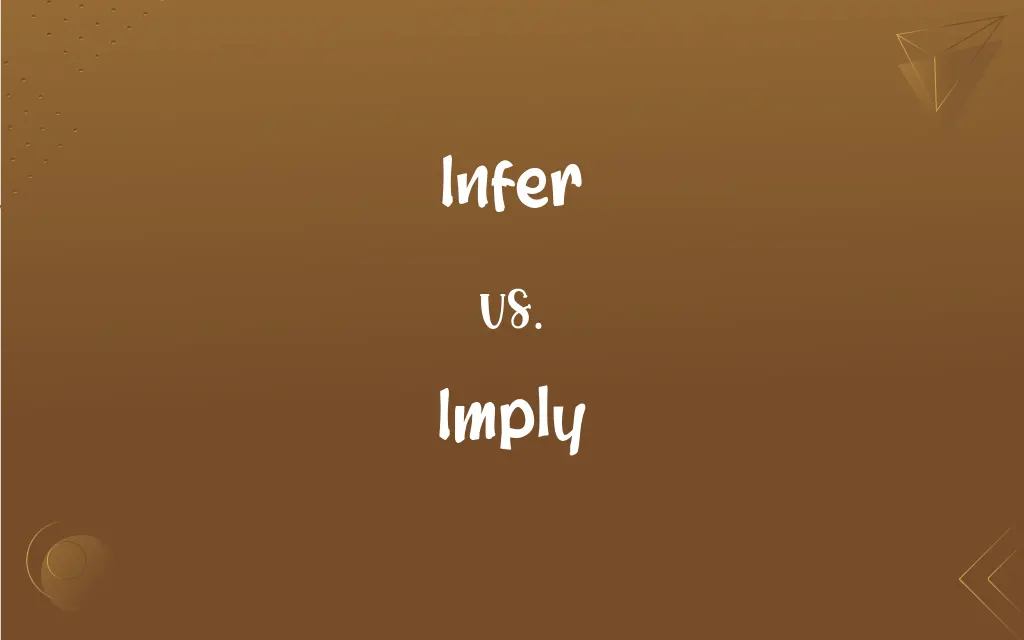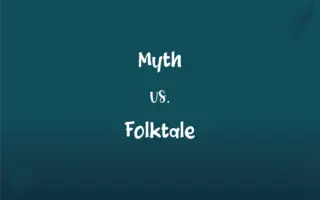Infer vs. Imply: What's the Difference?
Edited by Aimie Carlson || By Janet White || Updated on November 15, 2023
Difference between Infer vs. Imply in less than 2 lines, under 255 characters: To infer is to deduce or conclude from evidence, while to imply is to suggest something without stating it outright.

Key Differences
Difference between Infer and Imply in 4 or 5 paragraphs:
At the heart of communication, the words "infer" and "imply" play distinct roles. To infer is an internal cognitive action, meaning that a person draws a conclusion based on available information or evidence. It's a listener or reader's reaction to what has been said or written.
Conversely, "imply" is an act of the speaker or writer. When someone implies, they are hinting at or suggesting something without stating it explicitly. The implication resides in the realm of the unsaid, letting the listener or reader make their own judgments.
Consider a weather example: if a meteorologist says there's a high chance of rain, one might infer they should carry an umbrella. The meteorologist, by stating the likelihood of rain, is implying the potential need for precautions.
In the dynamics of communication, "infer" and "imply" are complementary. A speaker or writer implies, subtly conveying a message. In response, a listener or reader infers, deriving meaning or making judgments based on that conveyed message.
ADVERTISEMENT
Comparison Chart
Action
Drawing a conclusion
Suggesting something
Perspective
Listener's or reader's
Speaker's or writer's
Communication
Response to information
Act of conveying information
Explicitness
Based on interpretation
Often more subtle, not directly stated
Usage
"From his tone, I inferred he was upset."
"His tone implied he was upset."
ADVERTISEMENT
Infer and Imply Definitions
Infer
To deduce from evidence.
From the footprints, she inferred that someone had been in the garden.
Imply
To insinuate or connote.
Her tone implied that there was more to the story.
Infer
To conclude based on indications.
He didn't answer, leading her to infer that he didn't know the solution.
Imply
To suggest without stating directly.
His silence seemed to imply agreement.
Infer
To guess or surmise from suggestions.
She inferred from his expression that the news was not good.
Imply
To hint at.
The evidence implies a need for further investigation.
Infer
To reason out by deduction.
They inferred the historical events from ancient manuscripts.
Imply
To indicate by inference.
The message implied a sense of urgency.
Infer
To conclude from evidence or by reasoning
"For many years the cerebral localization of all higher cognitive processes could be inferred only from the effects of brain injuries on the people who survived them" (Sally E. Shaywitz).
Imply
To express or state indirectly
She implied that she was in a hurry.
Infer
To involve by logical necessity; entail
"Socrates argued that a statue inferred the existence of a sculptor" (Academy).
Imply
To make evident indirectly
His fine clothes implied that he was wealthy. See Usage Note at infer.
Infer
(Usage Problem) To indicate indirectly; imply.
Imply
To involve by logical necessity; entail
Life implies growth and death.
Infer
To draw inferences.
Imply
To have as a necessary consequence
The proposition that "all dogs are mammals" implies that my dog is a mammal.
Infer
(transitive) To introduce (something) as a reasoned conclusion; to conclude by reasoning or deduction, as from premises or evidence.
Imply
To suggest by logical inference
When I state that your dog is brown, I am not implying that all dogs are brown.
Infer
To lead to (something) as a consequence; to imply.
Imply
To hint; to insinuate; to suggest tacitly and avoid a direct statement
What do you mean "we need to be more careful with hygiene"? Are you implying that I don't wash my hands?
Infer
(obsolete) To cause, inflict (something) upon or to someone.
Imply
(archaic) to enfold, entangle.
Infer
(obsolete) To introduce (a subject) in speaking, writing etc.; to bring in, to adduce.
Imply
To infold or involve; to wrap up.
Infer
To bring on; to induce; to occasion.
Imply
To involve in substance or essence, or by fair inference, or by construction of law, when not include virtually; as, war implies fighting.
Where a malicious act is proved, a malicious intention is implied.
When a man employs a laborer to work for him, . . . the act of hiring implies an obligation and a promise that he shall pay him a reasonable reward for his services.
Infer
To offer, as violence.
Imply
To refer, ascribe, or attribute.
Whence might this distaste arise?
If [from] neither your perverse and peevish will.To which I most imply it.
Infer
To bring forward, or employ as an argument; to adduce; to allege; to offer.
Full well hath Clifford played the orator,Inferring arguments of mighty force.
Imply
Express or state indirectly
Infer
To derive by deduction or by induction; to conclude or surmise from facts or premises; to accept or derive, as a consequence, conclusion, or probability; as, I inferred his determination from his silence.
To infer is nothing but by virtue of one proposition laid down as true, to draw in another as true.
Such opportunities always infer obligations.
Imply
Suggest as a logically necessary consequence; in logic
Infer
To show; to manifest; to prove.
The first part is not the proof of the second, but rather contrariwise, the second inferreth well the first.
This doth infer the zeal I had to see him.
Imply
Have as a logical consequence;
The water shortage means that we have to stop taking long showers
Infer
Reason by deduction; establish by deduction
Imply
Suggest that someone is guilty
Infer
Draw from specific cases for more general cases
Imply
Have as a necessary feature or consequence; entail;
This decision involves many changes
Infer
Conclude by reasoning; in logic
Imply
To have as a necessary consequence.
The rules imply obedience by all participants.
Infer
Guess correctly; solve by guessing;
He guessed the right number of beans in the jar and won the prize
Infer
Believe to be the case;
I understand you have no previous experience?
Infer
To derive as a conclusion from facts.
Given the cloudy skies, one might infer rain is imminent.
FAQs
What might be a risk of implying too much in a statement?
Over-implication can lead to misunderstandings or misconceptions.
What does it mean to infer something?
To infer means to deduce or conclude based on evidence or indications.
Can one imply without intending to?
Yes, sometimes statements can have unintended implications.
Can a statement be both implied and explicit?
While a statement can be clear, it may also have additional implied meanings.
How can one improve their ability to infer correctly?
Enhancing listening skills and considering context can aid in accurate inference.
Can someone infer incorrectly?
Yes, misunderstandings arise when one infers incorrectly.
How does imply differ from state directly?
To imply is to suggest something subtly, without stating it outright.
How does context influence what we infer?
Context provides essential background that shapes our interpretations and inferences.
Is inferring always accurate?
No, inferences can be incorrect if based on misleading or incomplete information.
Why is it important to understand what someone is implying?
Grasping implications can lead to more accurate communication and avoid misunderstandings.
Is implying similar to hinting?
Yes, both involve suggesting something indirectly.
Is it better to infer or ask directly?
While inferring can be quick, direct communication is often clearer and more accurate.
Can you infer from non-verbal cues?
Absolutely, people often infer feelings or intentions from body language.
How can one make their implications clearer?
Being more explicit or providing examples can clarify implied meanings.
Can cultural differences affect what we infer?
Absolutely, cultural contexts shape how we interpret and infer information.
Why might a speaker choose to imply rather than state outright?
Implying can be more tactful, artistic, or allow listeners to draw their own conclusions.
Can an inference be based on prior knowledge?
Yes, previous experiences and knowledge shape our inferences.
Why is it crucial to distinguish between what's inferred and implied?
Recognizing the difference ensures more accurate communication and interpretation.
Can visual art imply meaning?
Yes, visual art often implies deeper themes or emotions.
Does poetry often rely on implication?
Yes, poetry often implies deeper meanings or emotions through nuanced language.
About Author
Written by
Janet WhiteJanet White has been an esteemed writer and blogger for Difference Wiki. Holding a Master's degree in Science and Medical Journalism from the prestigious Boston University, she has consistently demonstrated her expertise and passion for her field. When she's not immersed in her work, Janet relishes her time exercising, delving into a good book, and cherishing moments with friends and family.
Edited by
Aimie CarlsonAimie Carlson, holding a master's degree in English literature, is a fervent English language enthusiast. She lends her writing talents to Difference Wiki, a prominent website that specializes in comparisons, offering readers insightful analyses that both captivate and inform.






































































